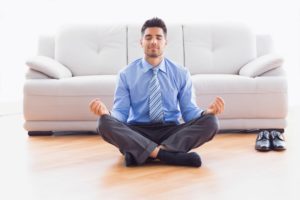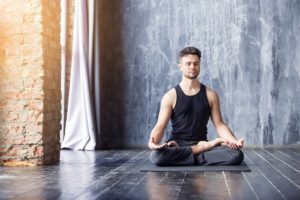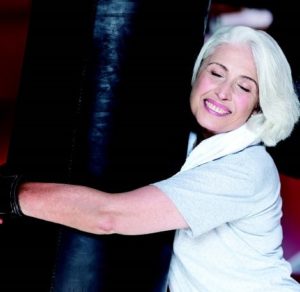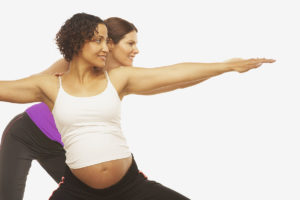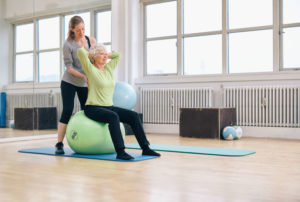Mindfulness & Meditation
10-Minute Meditation Helps With Anxiety
For people with anxiety, just 10 minutes a day of mindful meditation is enough to prevent the mind from wandering, according to a preliminary study reported in Consciousness and Cognition (2017; 51, 157–65). Mind-wandering disrupts productivity and contributes to accidents, and it’s particularly an issue for people with anxiety, as they tend to worry and ruminate about negative events that are not happening in the present moment.
Tai Chi: The Perfect Balance for Aging Adults
Why tai chi?
These Chinese movement patterns have been around for centuries. In recent years, study after study has proven the benefits of tai chi—particularly for older exercisers—yet most fitness professionals seem to know little about it.
That’s too bad, because just about any fitness client can learn tai chi, and any fitness professional can teach it. Like other types of exercise, tai chi simply requires you to learn its movements and experience its benefits.
Music Listening, Meditation and Brain Fitness
Older adults may be able to enhance memory and brain fitness by meditating or listening to music, according to preliminary research findings reported in the Journal of Alzheimer’s Disease (2017; 56 [3], 899–916). West Virginia University researchers in Morgantown, West Virginia, conducted the study to determine whether simple mind-body practices could boost cognition or improve perceived memory loss among older adults with cognitive decline.
Mind-Body Exercise and Menopause
Are you in menopause? Chances are that you sometimes feel that you are not in control of your body! If you are seeking ways to cope with unpleasant menopausal symptoms, you may want to try yoga and other mind-body practices.
Shirley Archer, JD, MA, 2008 IDEA Fitness Instructor of the Year, an award-winning author and IDEA’s mind-body spokesperson, explains the research and application of mind-body exercise on menopause.
Irritability and Mood Swings
The Poetry of Yoga
Some 80 million Americans were expected to try yoga last year, according to the 2016 Yoga in America Study (Yoga Journal & Yoga Alliance 2016). Couple this statistic with the continuing effort to entice baby boomers with new and effective movement class designs, and you get a sense of the opportunity yoga provides for dedicated teachers with skill and creativity.
Treatment Guidelines for Chronic Lower-Back Pain
While some people with lower-back pain may doubt whether movement is the answer, new treatment guidelines from the American College of Physicians (ACP) recommend nondrug therapies as the first line of treatment to relieve acute, subacute and chronic lower-back pain.
A Look at Meditation
Ezra Bayda and Elizabeth Hamilton, husband and wife, have been practicing Zen meditation for over 40 years and have taught for the last 20 at the Zen Center of San Diego. They lead retreats across the United States and in Australia and France and have led meditation in hospice venues and a retirement community. Katherine Watson, executive managing editor of IDEA Fitness Journal, interviewed them about the rising interest in meditation.
3 Ways to Use Stress to Fuel Peak Performance
Learn three strategies that sometimes may be more effective than trying to relax.
Menopause Symptoms: Can Yoga Help?
"Joanne," aged 51, presents with hot flashes and vaginal atrophy. She feels depressed, anxious, irritable, fatigued and not as confident in herself as she once was. Somehow she feels out of control. Her body is behaving unpredictably: She doesn't know when her next hot flash is coming or how to control the fat that is shifting up toward her waist.
Harness the Power of Positive Psychology
What makes life worth living? Among the answers are work, love and service. A playful attitude brought to bear on any of these adds to enjoyment and ultimately our judgment that life is being lived well. Health and fitness also make life worth living, as ends in their own right as well as means to other important activities. Again, if our pursuit of health and fitness can be spiced up with some fun, all the better.
Meditation: Practicing for Life
Ezra Bayda and Elizabeth Hamilton, husband and wife, have been practicing Zen meditation for over 40 years and have taught for the last 20 at the Zen Center of San Diego. They lead retreats across the United States and in Australia and France. Both have led meditation in hospice venues, and now they offer it in a retirement community.
IDEA Fitness Journal
recently interviewed them about the rising interest in meditation and what has kept them practicing for so long.
Taking Control With Mental Toughness Techniques
Sport psychology is dubbed the “science of success” because it studies the four mental toughness skills—motivation, confidence, concentration, and emotional and physiological control—that athletes use consistently, in conjunction with training and nutrition, to give them the ultimate performance edge. Whether you are a personal trainer, group fitness instructor, coach or mind-body wellness professional, the information, tools and techniques discussed here will help your clients to enhance their performance and give them the best shot at realizing their true potential.
How Positive Affirmations Can Help Boost Body Confidence
We think with our entire body. What we say affects how we feel. How we feel affects how we behave.
How we behave affects what we achieve. Thus, we must learn to effectively communicate with our bodies so that we have control over our performance and overall results.
5 Fascinating Facts We Learned on IDEA FitFeed This Week
Do treadmills accurately count calories burned? How many carbs are right for you? Can meditation slow the aging of your brain? Find the answers to these questions and other relevant news items on IDEA FitFeed. This inclusive tool gathers news articles, research studies, blogs and all content being shared by fitness professionals around the web and posts it in one convenient location.
Mind-Body Personal Training
When Tanya Colucci, MS, trains clients, she pulls from many different resources to offer the best results possible. Owner of Tanya Colucci Myofascial Release Therapy in Bluffton, South Carolina, Colucci believes in an integrative mind-body approach, which appears to resonate with many people. Case in point: client Aileen Worthington, age 71, who has osteoporosis.
How To Become a Mindful Personal Trainer
When leading client sessions, do you find that you have difficulty maintaining focus on the task at hand? Learn how to break the habit of mind wandering to become a more mindful—and fulfilled—personal trainer.
Mindful Walking
Walking can be more than just moving physically from one location to another. It can be a metaphor for your larger life journey. Things you’re walking toward are goals, aspirations, and dreams of a better future. Things you’re walking away from are fear, discomfort or negativity that is holding you back. Spend a few moments identifying things you would like to walk into and things you’d like to walk away from.
Mindfulness is the Best Sweetener
At your favorite lunch spot, they bake bread on the premises, and the delicious aroma of warm loaves has you salivating before you have even placed your order. You weren’t feeling especially hungry in the car and were thinking of eating a salad, but gosh, now that you’re here, wouldn’t you just love a chunk of that cinnamon-raisin bread with butter?
Research Looks at the Brain; Diabetes
Two distinct mental strategies used to manage pain—focusing attention externally and re-appraising the pain—involve different brain pathways, according to new research using functional magnetic resonance imaging (fMRI). The study appeared in the journal Anesthesiology (2011, 115 [4], 844–51).
Benefits of Mind-Body Activities for Kids
Today’s fast-paced, digital world pressures children to grow up fast. Instead of running around grassy playgrounds, most of them live highly structured lives, shuttling from one organized activity to the next, often while playing with hyper-stimulating devices. For school-age children, homework, peer pressure, teasing, poor grades, bullying, parental demands and isolation can all trigger stress.
- « Previous
- 1
- 2
- 3
- Next »





